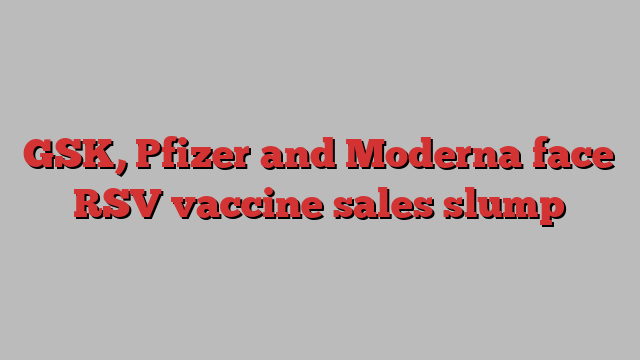
Stay informed with free updates
Simply sign up to the US & Canadian companies myFT Digest — delivered directly to your inbox.
GSK, Pfizer and Moderna together face an almost threefold reduction in adult respiratory syncytial virus vaccine sales in the US, according to new forecasts, after a health committee narrowed its recommendation for the drug’s use.
The US market for RSV in elderly adults could shrink from $4.7bn a year by 2030 to $1.7bn, according to new analysis by data provider Airfinity, after a US Centers for Disease Control and Prevention committee restricted its endorsement to older patients and those most at risk, and opted not to recommend booster vaccines for adults.
GSK, Pfizer and Moderna have all recently launched vaccines for the cold-like condition that typically strikes in winter, which older adults and young children are particularly vulnerable to.
The CDC’s Advisory Committee on Immunization Practices in June recommended routine vaccinations for the over-75s and those aged 60-74 at increased risk of contracting severe RSV, compared with previous guidance that all adults aged over 60 should be able to receive a vaccine after consulting a doctor. The committee also delayed a decision on whether to expand the vaccine to at-risk 50 to 59-year-olds.
While CDC recommendations can be revised as more data on the vaccines becomes available, Airfinity expects RSV sales for elderly Americans to fall from a forecast $3.7bn to $2.2bn in 2024, according to the data shared with the Financial Times.
The recommendations “will likely stunt revenue growth in the US market unless new data can support [the case for] booster shots,” said Isabella Huettner, Airfinity’s lead analyst of the RSV market.
GSK’s Arexvy was the world’s first approved RSV vaccine, receiving backing from the US Food and Drug Administration in 2023, shortly before Pfizer’s Abrysvo treatment, which can also be given to pregnant women. Infants can receive Beyfortus, an antibody treatment developed by AstraZeneca and Sanofi.
Analysts consider Arexvy’s US rollout to have been a success, with the company quickly taking two-thirds of RSV vaccine sales in the US and earning blockbuster status within nine months by making more than $1bn in revenue. The company has forecast that Arexvy annual sales will peak above $3bn.
GSK had bet on an expansion of the jab’s use to at-risk over-50s to increase sales, but the ACIP delay has amounted to about $300mn in lost revenue this year, according to Airfinity. GSK, which reports second-quarter results next week, declined to comment on the figures.
ACIP said it needed more data to recommend wider use of the vaccine, after a small number of clinical trial participants developed Guillain-Barré syndrome, a rare condition affecting the immune system.
The ACIP decision in June surprised markets, leading to a 6 per cent drop in GSK’s share price. The RSV jab was Moderna’s second approved product. Shares in the biotech fell after data showed that protection from its recently approved mRNA-based vaccine waned more quickly than rival jabs by GSK and Pfizer.
Calling the decision “a blow” to Pfizer and GSK, Citi analyst Peter Verdult noted that the ACIP decisions were “largely driven by cost-effectiveness”. Arexvy’s list price is $280 per dose, compared with $295 for Abrysvo.
If manufacturers were to reduce list prices, then it was “likely” the RSV vaccination would be considered more cost effective, he added.
The companies should see further growth from increasing international sales, with the launch of RSV vaccines in Europe and Canada. But GSK suffered a further setback in June when the UK chose to use Pfizer’s Abrysvo jab for pregnant women and those over the age of 75 in this winter’s rollout.
Airfinity’s previous estimates of $4.7bn in sales per year had assumed an annual booster shot. If booster shots every two years were recommended, annual revenue for RSV vaccines would reach $6.6bn by 2030.
GSK said: “We have an extensive ongoing development plan for Arexvy and continue to see this exceptional vaccine as a significant long-term growth opportunity for GSK.”
Pfizer said it remained “well positioned in this competitive marketplace”. “The decision by the CDC’s ACIP . . . reinforces the importance of protecting adults over the age of 60 at increased risk for severe RSV disease,” said the New York-based drugmaker. Moderna declined to comment.